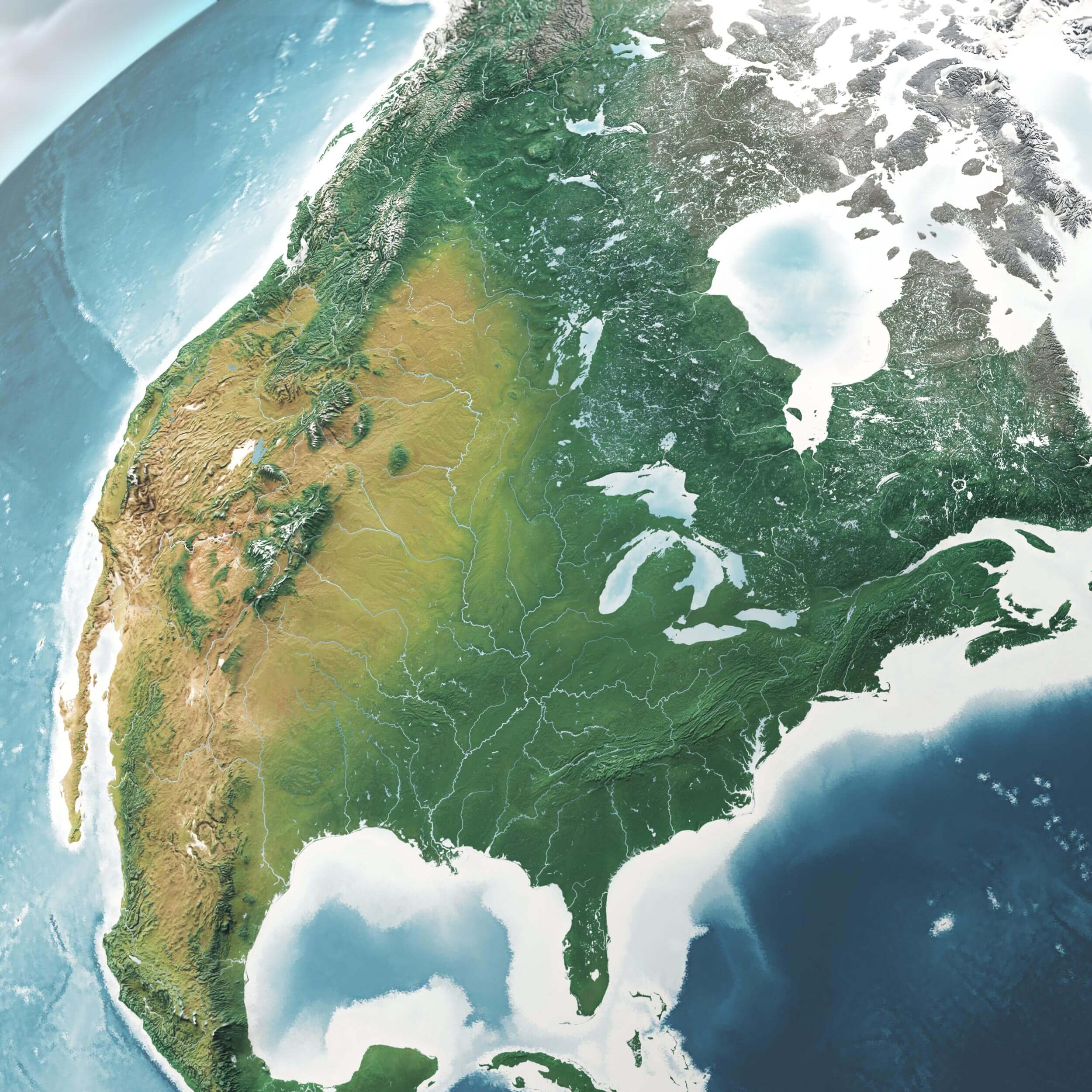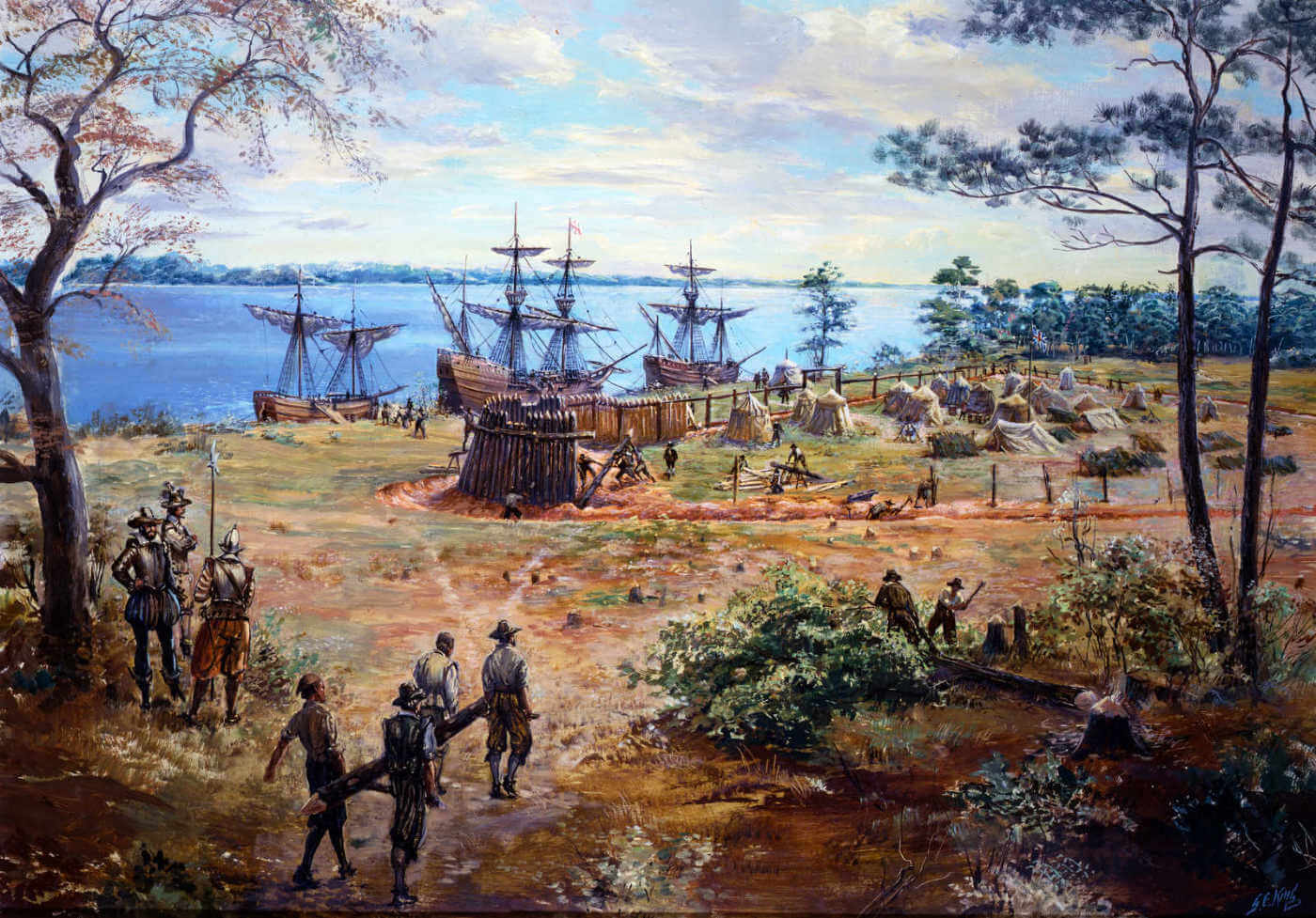James Fort
A nice little town like ours
What can he do less hurtful to any, or more agreeable to God, than to seek to convert these poor savages to know Christ and humanity, whose labours with discretion will triple requite thy charge and pain. What so truly suits with honour and honesty as the discovery of things unknown, erecting Towns, peopling Countries, informing the ignorant, reforming things unjust, teaching virtue and gain to our native mother country.
John Smith
Once again, three ships are being readied to sail. On the banks of the Thames in Blackwell, East London, in December 1606, 105 men prepare themselves to venture into the unknown, to settle unimaginably distant lands, to make their fortunes in Virginia. Fortunes are waiting to be made, as a play popular in the theatres of London assures them: I tell thee, gold is more plentiful than copper is with us… Why, man, all their dripping pans and their chamber pots are pure gold… and as for rubies and diamonds, they go forth on holy days and gather them by the seashore, to hang on their children’s coats and stick in their caps.
Who would actually believe this? Maybe they do.
Everyone knows the Spanish have discovered literal mountains of treasure, and popular legend is full of tales of lost lands and distant wonders, of Edenic homelands awaiting rediscovery by man. Why else would so many gentlemen hazard this trip, so many men without skills or any experience of labour, who don’t even know how to farm? Why else are they leaving in December, when the planting season is long past? What do they expect to live on, if not jewels they will gather from the beaches and the bounty of paradise? These are men who believe in legends, believe in heaven. They believe in hell too.
Three ships set sail on 20 December. The Susan Constant is their flagship, around 35m long and carrying 71 of the colonists, under the command of Christopher Newport, an old-hand at privateering and plunder who had lost his right arm in an attack on Spanish treasure ships sailing from Mexico. She is accompanied by the smaller vessels The Godspeed, and The Discovery. Many of the settlers are the well-connected scions of noble families, barons and Privy Councilors, footloose and purposeless younger sons out to make their own names, and of course their own fortunes. Others are old soldiers, freebooters and veterans of the Dutch Wars and Irish campaigns: George Kendall had been wounded five times in the Low Countries, and had served for many years as a spy among European Catholics (a lucrative business, and Kendall is most likely spying still, for the Spanish this time). The average age of the settlers is 40, though four of them are just boys: orphans, runaways, expendable.
The crossing is rough - for six weeks headwinds blow them right back to England, as though paradise is not quite ready to be regained. But come February they make it into open seas, and after refuelling in the Canaries the fleet reaches the Caribbean and heads northwest up the coast of America to their goal, Chesapeake Bay, Virginia. Anchoring at Cape Henry, so named after King James’ eldest son, they explore the bay and open a sealed box containing their instructions from the London Company that has mounted this expedition. This names a seven-man ruling council, including Newport, the captains of the other two ships (John Ratcliffe and Bartholomew Gosnold), George Kendall, lawyer John Martin, Irish and Dutch wars veteran Edward Maria Wingfield, and a wild card: yeoman farmer and adventurer John Smith. This last choice is slightly awkward as Smith is locked up in the Susan Constant’s hold – Newport has had him imprisoned, and indeed almost hung him en route on a Caribbean beach. Their task is to build a fort, to maintain a colony, and to govern England’s first settlement in the brave new world of America.
The Virginia Company of London is a joint stock company chartered by James I to establish settlements in America. The Company is covering the costs of this endeavour, and in return owns the lands and resources (the gold, the jewels…) granted to it, from which its investors hope to earn a healthy profit (a share in the Company costs £12 10 shillings, which is around six months’ wages for a labourer). Aside from the gold, they have tasked the expedition with discovering a navigable route through to the ‘other sea’ and onwards to the Indies, with locating any survivors from the lost Roanoke colony of the 1580s, with establishing the authority of the English crown over any native princes they might happen to encounter, and of course with spreading the Christian gospel for good measure. How the Spanish will react to this incursion is unsure: the two nations are in a period of uneasy truce, but the King’s Secretary of State Robert Cecil is uncertain of their prospects, and has resolved that the venture should be left unto the peril which they incur thereby
. Meaning the colonists are on their own…
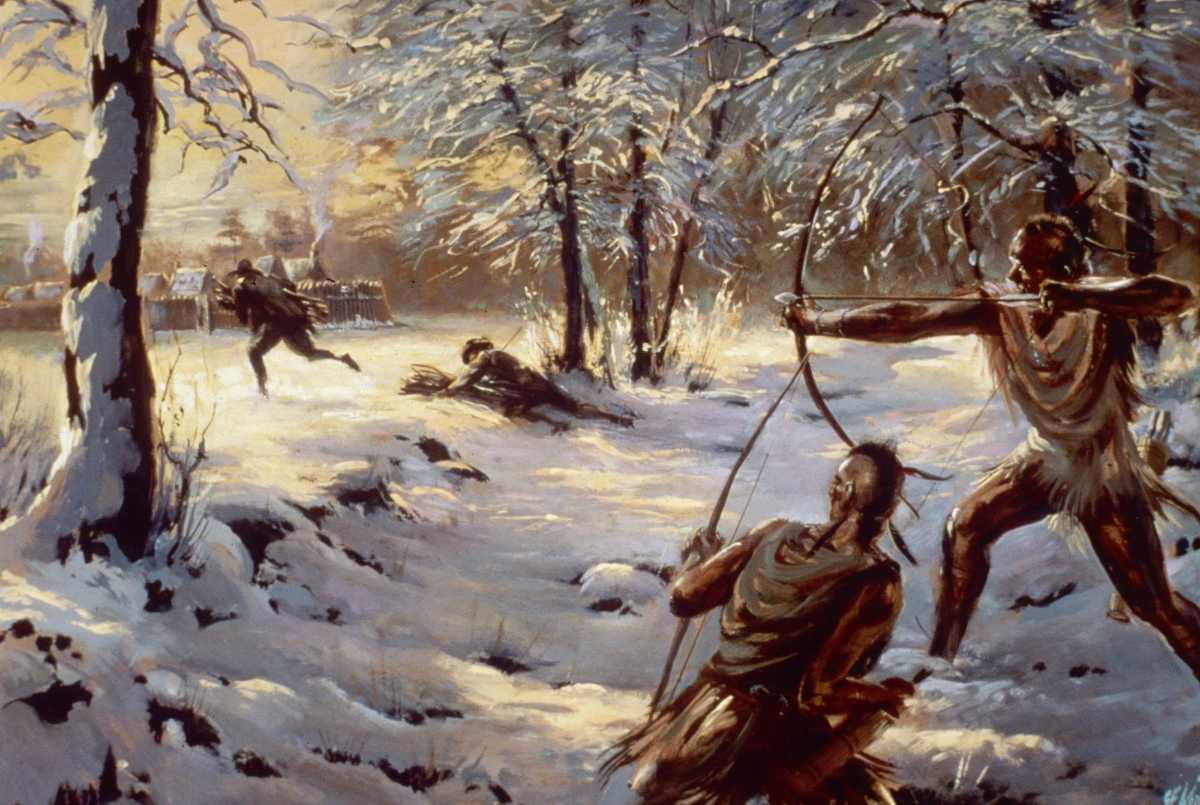
Not entirely on their own. The Chesapeake Bay is home to the Powhatan confederacy of Algonquian tribes, a population of some 10,000–15,000 native Americans ruled over by their chief Wahunsenacawh (also known as Powhatan). They call their land, tidewater Virginia, 'Tsenacomoco', which means 'densely inhabited land', and it is, for the Jamestown settlers arrive almost a decade before and some hundreds of miles south of the epidemic that will devastate New England in 1616-19. The Algonquians are hunters, fishermen, and farmers, though they count some 3,000 warriors among their number. They go lightly dressed in all but the coldest months, and wear elaborate tattoos across much of their bodies, their skins painted red and often smeared with bear fat, for warmth and to ward off the mosquitoes. The men shave their hair on the right hand side of their heads, to keep it from tangling in their bowstrings. They have met white men before, for the Spanish have ventured up these coasts in the past. They know their visitors may bring them useful gifts, especially the copper they have long-prized for its reflective almost spiritual qualities. But no-one is under any illusions that they are gods.
The James Fort, later Jamestown, is founded on 14th May 1607 on a promontory in the James River. Algonquian guides have helped the English find their spot. It has deep water access for their ships, and the narrow strip connecting it to the mainland is easily defensible. But the river water is salty and the surrounding swampland infested with mosquitoes. The gentlemen are somewhat discouraged by the lack of riches there for the taking, for the marshy shores are conspicuously lacking in jewels. Most have never worked and they are not inclined to start now - they earn their salaries all the same. They can't farm, their muskets make for poor hunting weapons, and their full body armour is oppressive in the summer heat. Bathing is considered unhealthy, so they don't. Disease runs rampant. Food runs short. By the end of the year, more than three-quarters of them will be dead. More will come. They will die too.
It isn't just starvation: in the early months the colonists dine well on mussels and oysters, deer and turtles, and sturgeon caught from the river. But by August 1607 they are down to around 500 calories a day. There is disease: malaria, dysentry, typhoid and scurvy take their toll, thanks in part to contaminated drinking water (the tidal wash up the James River often returned the colonists own sewage back to them in their drinking water). And then there are the natives. From late May, as it becomes increasingly obvious the settlers are here to stay, the Algonquin surround the fort and shoot arrows over the walls. On 31st May Eustace Clovill staggers in peppered with six arrows: he dies eight days later, by which time another colonist has been killed while using a latrine beyond the pallisade. They died, wrote George Percy (younger son of the Earl of Northumberland and later Governor) of the bloodie fluxe… of the swelling… of a wound… cruel diseases… and by Warrs… but for the most part they died of mere famine
.
In late June Newport heads back to England for resupply in the Susan Constant and the Discovery. The Godspeed's sails are removed, to remove any temptation to desert. As the pressure mounts the beseiged settlers turn on one another, spuurred on by hunger and fear. The Council members are suspected of hoarding food, and many others of being sectarian spies or Spanish agents. President Wingfield is overthrown and then reinstated, George Kendall is arrested, then tries to flee, and is executed, and Smith himself is sentenced to death on suspicion of collusion with natives - only Newport's return saves him from hanging.
It would be too tedious, too strange, and almost incredible should I particularly relate the infinite dangers, plots and practises…
John Smith
The Jamestown colony cannot survive. That it does is down to constant resupply from England, new reserves of settlers, and fresh stores of food and other provisions. The Virginia Company grows restless, for the barrels of gold deposits Newport brings back in 1607 prove worthless, something that is hastily attributed to loading the wrong sample. But more men are sent (and even, in late 1608, women, when Thomas Forrest takes his wife and young maid). John Smith leads extensive explorations of the surrounding country, encountering Monacans further up the James River, and Chickahominy to the north, the Susquehannock around the Chesapeake Bay (who already possess iron weapons and tools they have traded with the French) and the Rappahannock in the south-west. The colonists try to trade, they search fruitlessly for a 'great water beyond the mountains', and dig in vain for gold, they even search in a desultory fashion for survivors of Ralegh's Roanoke venture. And all the while more hungry mouths arrive.
Back in England however the young Prince Henry, much-loved heir to the throne, has taken up the cause. He is friends with Sir Walter Ralegh (currently incarcerated in the Tower of London) and a vocal enthusiast for messianic Protestantism. His chaplain, Daniel Price, delivers impassioned sermons from St Paul's Cross in the heart of London, decrying the corruption of the Old World and extolling the new with Puritan fervour. London,
he declares, should be Jerusalem, the City of God, and it is become Murder's slaughterhouse, Theft's refuge, Oppressor's safety, Whoredom's stew, Usury's bank, Vanity's stage, abounding in all kinds of filthiness and profaneness.
From the same spot lector William Symonds rhapsodises about the plantation of heaven and earth: For the Lord had said unto Abram, get thee out of thy Country, and from thy kindred, and from thy father's house, unto the land that I will shew thee. And I will make thee a great nation…
In May 1609 a fleet of eight ships carrying 600 new settlers, and the new Governor, Sir Thomas Gates, is despatched. It has had to make up numbers with 30 'unruly youths' (whose fares have been paid by their home parishes eager to be rid of them), and 30 serving women. This fleet takes a more direct transAtlantic route route to avoid the Spanish, but sickness kills many en route, and a massive hurricane scatters their fleet. Only four of the eight that had departed manages to assemble at Cape Henry in August. The flagship, The Sea Venture, and all its passangers, including Gates, are feared lost, but several hundred hungry and the sick survivors, those who have not already been given up to the waves, have reached their Promised Land.
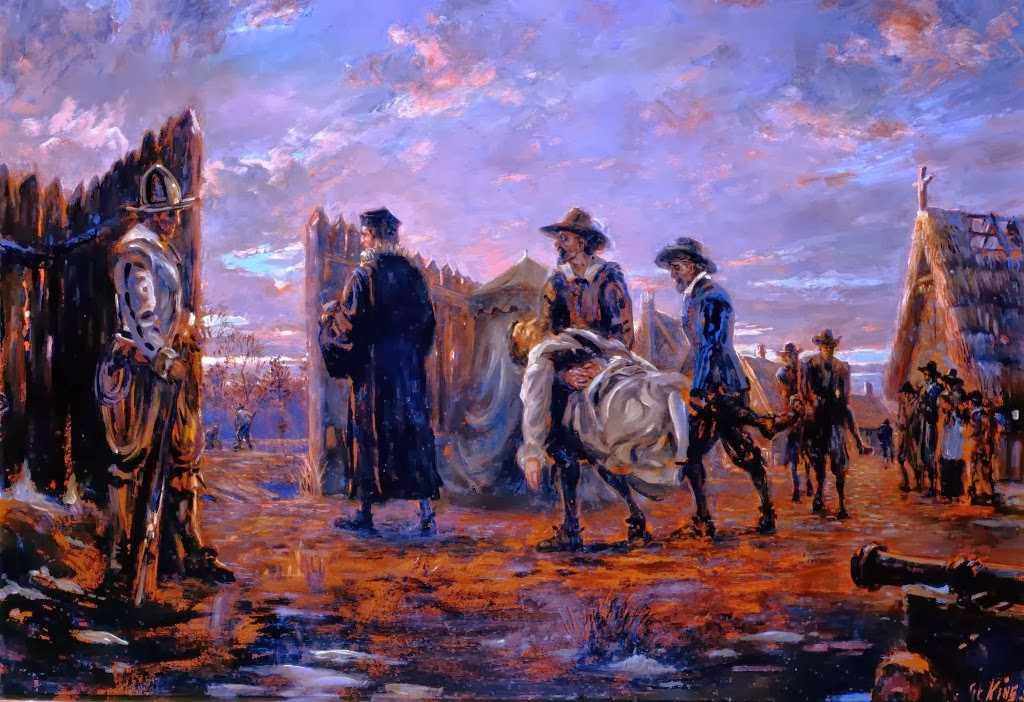
The crew and passengers on The Sea Venture are the lucky ones. Tossed by the storm for three whole days, the caulking in her hull (the sealant between the timbers) fails and she takes on heavy water. Those on board pump and bail water for days, throw their weapons and possessions overboard to lighten the load, and even stuff beef between the timbers to plug the leaks, all to no avail. Their endeavours keep them alive long enough to spy land though, and when their vessel grounds on the rocks some 150 are ferried to shore. They are marooned on Bermuda, part of the Devil's Islands, the farthest of all the islands that are yet found at this day in the world
, stuck here for nine months, through autumn and winter, enduring very hot and pleasant
weather and eking what subsistence they can from the vast quantities of fish and sea turtle they catch, from the wild boar that roam the island, from the lobster, crabs, oysters and whelks they gather, from the seabirds that literally alight upon their arms and heads, and from the melons, peas, onions, raddish and lettuce that begin to sprout within days of being sewn. Somewhat unwisely they are determined to carry on though, and in time they set to work fashioning new ships out of salvage from The Sea Venture and the abundant cedar wood growing on the island. There are disagreements, inevitably, about who is in charge, between Gates as Governor of Virginia (they are not, of course, in Virginia) and Sir George Somers as Admiral of the fleet (though the fleet has been mislaid). Some of the men threaten rebellion, and are transported to a desert island for their troubles. Finally The Deliverance and The Patience are ready, and on 10th May 1610 they set out, once more, for Virginia. Eleven days later they reach the mouth of the James River, somewhat overdue. They are greeted by the blast of cannon.
Winter has not been kind to the colony. John Smith has been made President, and resigned. He wants the colonists to survive living off the land, while a new provisional Governor, Thomas West, wants to built a new capital. The Algonquian attacks persist, and in October 1609 Smith is badly-injured in a gunpowder explosion, and has to return to England. Percy succeeds him, but is too ill to lead with any vigour or initiative. Ratcliffe leads a party of men to bargain for food with their neighbours but they are swindled and massacred: Ratcliffe himself meets a particularly gruesome end. The outer settlements are abandoned as everyone retreats to the fort. The horses are eaten first, then chickens and pigs, and dogs and cats. Rats, mice, snakes, toadstools, anything the settlers can get their hands on to see them through the winter. It is not enough. Some flee into the forest. Most are picked off by the natives. George Percy, an assiduous chronicler of their misery, records that some did those things which seame incredible, as to digge upp deade corpses outt of graves and to eate them… and some have Licked upp the Bloode which hathe fallen from their weake fellows.
One of their number, Henry Collins, is found to have murdered his pregnant wife and ripped the childe out of her woambe… chopped the mother in pieces and salted her for his foode
: when discovered, he is burned for his horrible villainy
.
Then, having fed upon horses and other beasts as long as they lasted, we were glad to make shift with vermin, as dogs, cats, rats, and mice. All was fish that came to net to satisfy cruel hunger, as to eat boots, shoes, or any other leather some could come by. And those being spent and devoured, some were enforced to search the woods and to feed upon serpents and snakes, and to dig the earth for wild and unknown roots, where many of our men were cut off and slain by the savages.
George Percy
When Thomas Gates and the Bermuda party reach Jamestown on 23rd May 1610 they find it seemingly abandoned, the pallisades broken, fort gates swinging open, the houses empty and chapel derelict. Some sixty or so settlers remain from the 400 of the previous autumn (though more might have survived, especially women and children, by seeking refuge with local tribes).The food stores from Bermuda are slight, their prospects hopeless. On 7 June everyone left boards the ships, choosing to abandon Jamestown forever.
They don't. They can't, for sailing back up the James they encounter another flotilla, three more ships from England, 300 men, and the new governer, Thomas West, Baron De La Warr (for whom the river and state of Delaware are named). Jamestown is recast as a military camp, befitting many of the veterans De La Warr has brought with him, described by Richard Hakluyt as hammerours who would 'prepare' natives for our preachers' hands
. De La Warr and his successor (he is taken ill in 1611 and returns to England) Sir Thomas Dale enact the Company's declaration of martial law: sodomy, adultery, fornication, theft, desertion, all are punishable by death (also sacrilege, slander, even making too much noise). As our ever-reliable racounteur George Percy records, the idle and would-be deserters are appointed to be hanged, some burned, some to be broken upon wheles, others to be staked, and some to be shotte to deathe. All theis extreme and crewell tortures [Dale] used and inflicted upon them to terrefy the reste for attempteinge the lyke
.
The tactics deployed in Ireland are brought to bear upon the nearby tribes. Attacks are launched without warning or quarter, with no distinction for age or sex, between warriors and non-combatants. Steel-armoured musketeers methodically clear swathes of nearby forest, siezing lands and burning fields. Percy himself leads an attack on a Pasapegh village, destroying their homes and killing some 15 warriors, taking their queen and her children hostage. On the way home they decapitate their sole male captive, then throw the children overboard, shotingge owt their Braynes in the water
. Upon their return De La Warr is unhappy that the queen is still alive and orders Percy to burn her: as some small mercy he has her killed by sword instead. The English are resolved to dominate their neighbours, to take the nearby land, to 'civilise': William Strachey justified these actions in his History of Travaile into Virginia Britannia as those of a father beating his child to bring him to goodnes
.
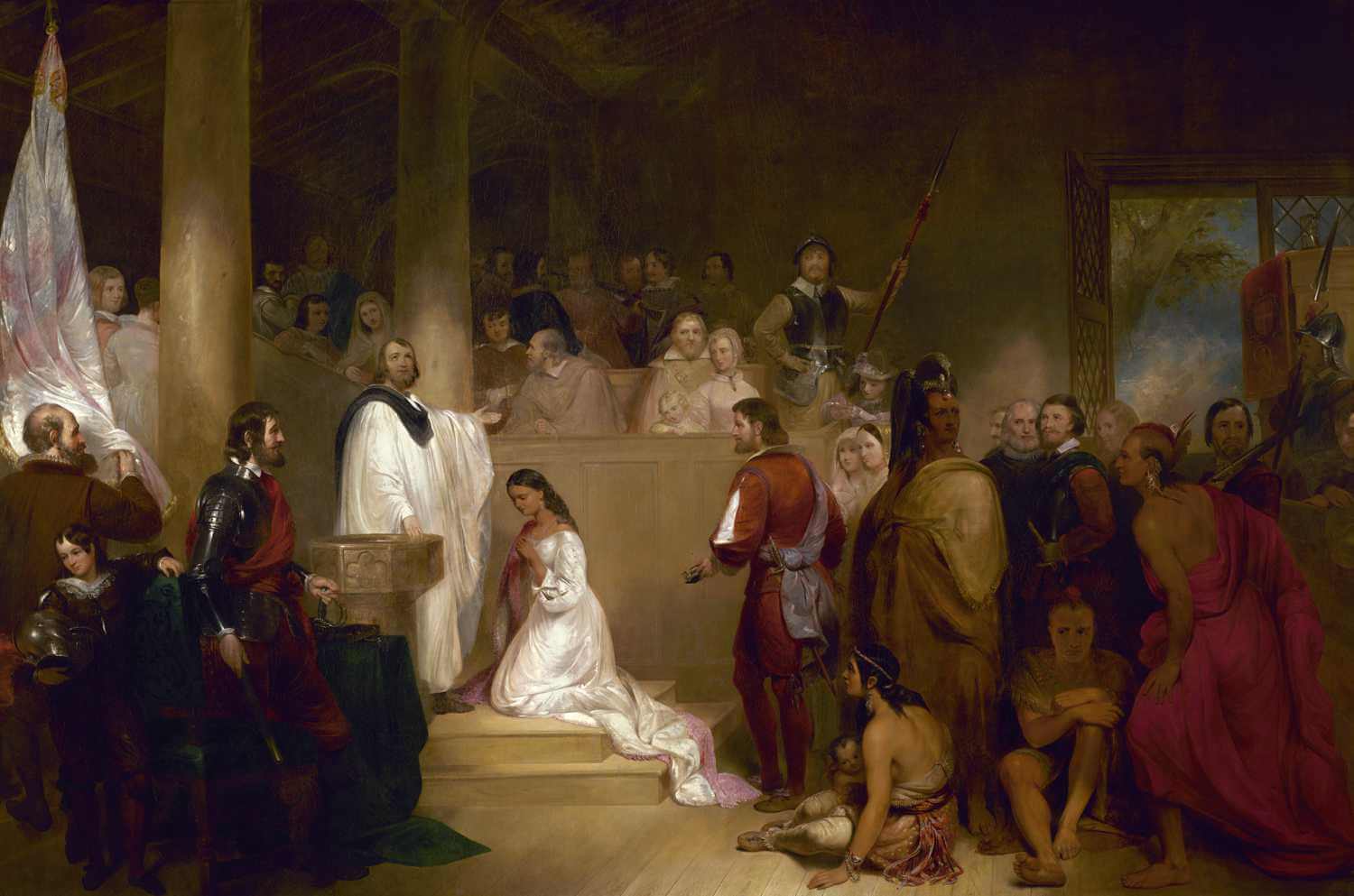
The colonists continue to die - within six months of De La Warr's arrival, one third of those who came with him are dead - but the colony endures. Its future is transformed by another arrival: tobacco. In the spring of 1612 John Rolfe, one of the Bermuda castaways, plants a packet of seeds given him by a London tobacco merchant, a south American variety that spreads like wildfire through the fort, and which delivers a pleasant, sweet, and strong
taste when smoked. With heavy duties levied on tobacco imports from the Spanish colonies, English markets are ripe for a new supply, and from 1614 Virginian tobacco harvests begin to meet it. Rolfe is also instrumental in securing a period of peace with the Powhatan tribes, when he marries the tribal princess Pocahontas (an enduring nickname for Matoaka, a favourite daughter of Wahunsenacawh), who was captured by Captain Samuel Argall in March 1613. He is motivated, he attests to Governor Dale, not by the unbridled desire of carnal affection, but for the good of this plantation, for the honor of our country, for the Glory of God, for my own salvation…
. She is baptised a Christian, reborn as Rebecca, and is betrothed to Rolfe on 5th April 1614. The 'peace of Pocahontas', a symbolic tying of the knot between the two cultures, will last for eight years and stands as a symbol, to those looking for one, of the inevitable triumph of Protestantism, and of and England, in Virginia.
Not being acquainted nor accustomed to encounter with men in armor, much wondered thereat especially that they did not see any of our men fall as they had done in other conflicts. Whereupon they did fall into their exorcisms, conjurations, and charms, throwing fire up into the skies, running up and down with rattles and making many diabolical gestures with many ungrammatical spells and incantations, imagining thereby to cause rain to fall from the clouds to extinguish and put out our men’s matches and to wet and spoil their powder, but neither the devil whom they adore nor all their sorceries did anything avail them, for our men cut down their corn, burned their houses, and besides those which they had slain brought some of them prisoners to our fort.
George Percy
Bibliography
- Bailyn, B. (2012) The Barbarous Years: The Peopling of British North America: The Conflict of Civilizations, 1600-1675. New York: Alfred A. Knopf.
- Brogan, H. (2001) The Penguin History of the United States of America (2nd ed.), London, Penguin.
- Hakim, J. (2003) Making Thirteen Colonies - 1600-1740 (3rd ed.). New York, Oxford University Press.
- Rosenberg, R. (2005). The (Con)founding of America: Jamestown 2007 and the Ideology of Travel Literature. Studies in Popular Culture, 28(2), 33-48. Retrieved February 10, 2020, from www.jstor.org/stable/41970430
- Wooley, B. (2007). Savage Kingdom. The True Story of Jamestown, 1607, and the Settlement of America. New York, Harper Perennial.

